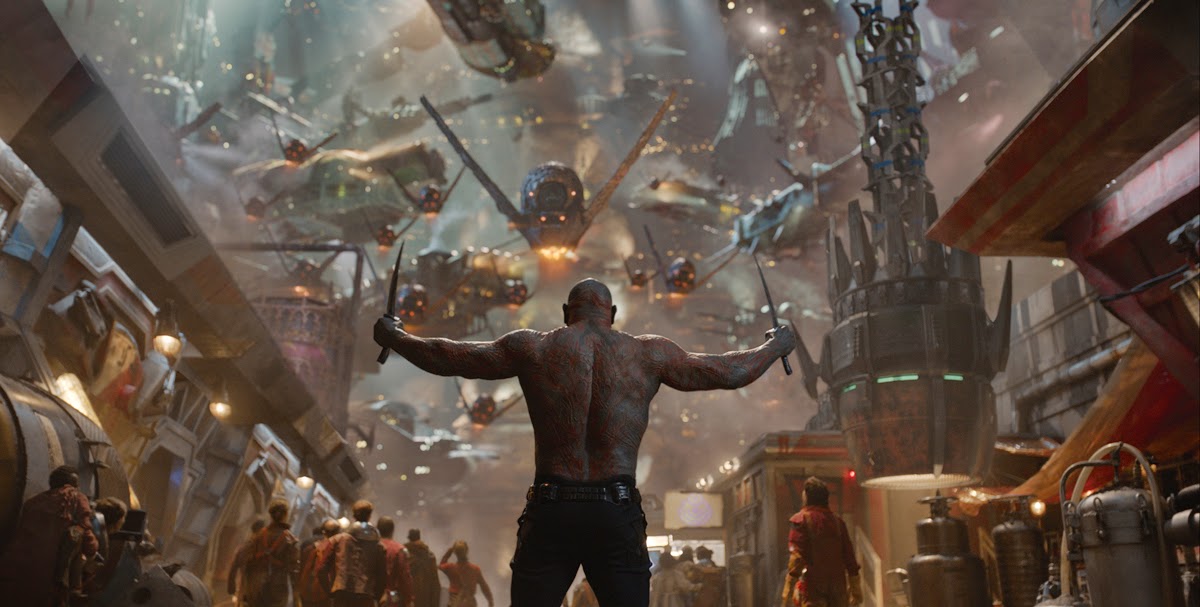The best joke of the summer has no punchline, but the setup is priceless: A human, a raccoon, a green woman, a tree and a man incapable of understanding metaphors walk into a bar … If you really need a punchline, then stay tuned to Guardians of the Galaxy, and the sequel, and The Avengers sequel, and the raccoon spin-off, and the TV show, and the reboot 15 years from now, and read the comic book, and then its reboot. But that punchline will come, eventually.
Ignore my condescension about Marvel’s franchise stretching — I really did enjoy Guardians of the Galaxy and its wackadoo cast of characters, who might not be as mighty as the Avengers, but are infinitely more interesting, funny and present. Even the raccoon, who nature tells us should be picking through the trash and clinging to human faces in Farrelly Brothers comedies, is a breath of fresh air blown over Marvel’s stable of increasingly stale comic characters. If you'll recall, Captain America slept through his last adventure, Iron Man seemed bored, Hulk is a pyrotechnic afterthought, and Thor is a third-rate thespian in an explosion-filled Hamlet. I've grown tired of these emotionally wounded men and their faltering identities, which is probably why James Gunn’s Guardians of the Galaxy feels so invigoratingly unconventional.
The movie is set in space as salvage captain and bounty hunter Peter Quill (Chris Pratt), aka Star-Lord, cruises through the galaxy looking for space junk to sell. When he finds a metallic sphere containing a piece of soul-sucking rock, he unleashes all kinds of problems that eventually unites him with green-skinned Gamora (Zoe Saldana), alien muscleman Drax (Dave Bautista), pint-sized Rocket Raccoon (voiced by Bradley Cooper) and Rocket’s tree friend Groot (voiced by Vin Diesel), who only says 'I am Groot,' yet Rocket understands him like Timmy with Lassie. Each character has their own personality and quirks, and I found myself cheering on all of them. None of the characters have superpowers, another refreshing tweak for a comic-movie, which means they have to get out of jams using ingenuity and teamwork.
Their teamwork shines during several high-octane action sequences in a space-prison, which they escape from without the help of a man’s prosthetic leg, and a Mos Eisley-like trading post built inside the decaying brain of a deceased space titan. The locations are something else. In the brain station, Star-Lord, Rocket and Gamora jump into mining pods to engage starfighters on the edge of space. The scene features something I've never seen before in a sci-fi movie: Star-Lord crashes through the hull of a fighter and uses his mining pod’s robot arms to fly the enemy ship. It’s a man piloting a ship piloting another ship, and it's appropriately zany. Later we meet a man who can control a single metal arrow with a whistle — I wonder what the arrow does during a basketball game.
Our five heroes are fighting back against Gamora's ex-partner, Ronan, who is trying to recover the all-powerful rock, one of five Infinity Gems, for his boss Thanos, a stone-faced villain whose throne is definitely not eco-friendly — even the armrests have little jetpacks on them to provide comfy forearm support. Thanos is the main villain, but he’s only here to tease future films, ones that will feature even more Infinity Gems and eventually the Infinity Gauntlet, which is some kind of no-limit credit card or something. I enjoyed this movie, but this sequel baiting is annoying. Fanboys might adore it all, but it all feels kind of icky and corporate the way Marvel has spread its storylines out across so many different mediums. Somewhere a marketing director is praying to a plaque that reads "synergy."
All that aside, though, Guardians of the Galaxy is a whopper of a franchise starter. And not since the Hellboy franchise have I been this excited about a comic-movie. Guardians soars mostly because the characters are likable and funny. And because it has a different tempo than the other earth-bound comic movies. But mostly because it’s funny. Pratt, eternally Andy Dwyer from Parks and Recreation, is the right fit here as the smart-ass space jockey. He’s a big doofus, of course, but he’s also macho enough to carry the action, which is intensely orchestrated into gunfights, space races, laser battles and martial art spectacles. He has a gag about a blacklight in his dirty space cruiser that must have shot soda out of a dozen noses in the theater I saw it in. In another great line, he says he comes from Earth, "a planet of outlaws — Billy the Kid, Bonnie & Clyde, John Stamos."
Television wrestler Dave Bautista's Drax will also be a fan favorite. Drax speaks, hears and thinks in literal terms — metaphor and symbolism are beyond him. When a prison inmate threatens one of our guardians with the old knife-across-the-throat gesture, Drax seems perplexed: "I will not drag my finger across his throat … But I will kill him." Later, it's implied sarcastically that nothing goes over Drax's head. His response: "Of course nothing goes over my head because I will catch it."
Add into all this Bradley Cooper's exasperated snickering, Vin Diesel's octave-busting "I am Groot," and the lovely Zoe Saldana all covered in green skin and you have a wild, free-wheeling sci-fi flick with a stellar cast, some genuine laughs and a damned fine soundtrack of ’70s rock. I can't ask for any more from Marvel. Except maybe fewer movies.



















































